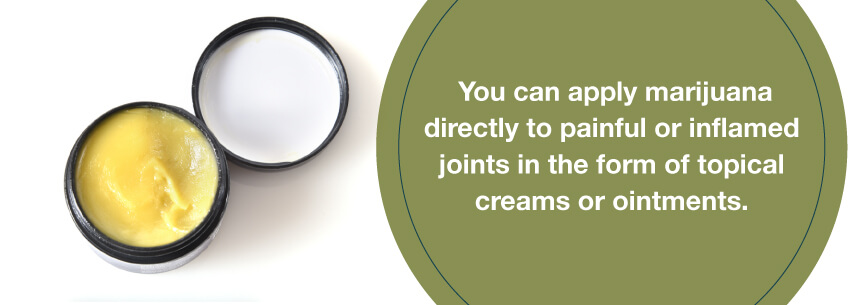
For those who suffer from Felty’s syndrome — also sometimes called Felty syndrome — medical marijuana can be an effective alternative treatment option. Cannabis has many medicinal properties, most of which could alleviate the symptoms that are directly associated with this syndrome, such as pain, inflammation, loss of appetite and fatigue. If you or someone you know suffers from Felty’s syndrome, keep reading to find out more about this disorder and how medical marijuana could help.
Felty’s syndrome (FS) is a rare disorder that involves the combination of three conditions — seropositive rheumatoid arthritis (RA), an enlarged spleen (splenomegaly) and a diminished white blood cell count (neutropenia). In almost every case, Felty’s syndrome develops after years of suffering from the degenerative effects of rheumatoid arthritis. However, in very rare cases, it is possible to develop Felty’s syndrome as soon as you develop RA. There is still much to be learned about this disorder, including its causes and possible cures.
In 1924, an American physician named Augustus Roi Felty observed a case of the disease that now bears his name while working as an assistant resident in medicine at the Johns Hopkins Hospital. He looked through the hospital’s journal archives for similar cases and found four accounts, which he described in a bulletin in 1924. When Hanrahan and Miller wrote about another case of combined RA, splenomegaly, and neutropenia in the Journal of the American Medical Association eight years later, they referred to the disorder as “Felty’s syndrome,” and the name remained.
Even after labeling this combination of conditions and continuing to observe the disorder for almost a century since it was identified, the medical community is still largely in the dark on how and why this disorder develops. Today, a patient doesn’t necessarily have to have all three conditions to be diagnosed with Felty’s Syndrome — the presence of RA and persistent neutropenia with an ANC under 2,000 per cubic millimeter is enough to merit a diagnosis of FS.
Current theories regarding FS are that it may be an autoimmune disorder and that it could be passed on genetically through an autosomal dominant trait.
Many cases of FS go undiagnosed since patients may only experience symptoms associated with rheumatoid arthritis. In addition to RA symptoms, such as joint inflammation and pain, patients with Felty’s Syndrome may experience other symptoms, such as:
Felty’s Syndrome is especially dangerous because of its potential complications, especially if not properly treated. Patients with FS have depressed immune systems, making them more susceptible to serious infections and septic shock. Common types of infections include pulmonary (lung) and skin infections. Sometimes, infections can be life-threatening. In a study that traced 32 patients with FS, five experienced fatal cases of bronchopneumonia. Regular vaccines and other immune-boosting treatments can reduce your chances of experiencing a serious infection.
Felty’s Syndrome is rare and does not affect all populations equally. Take a look at some of these statistics on FS and those who are affected by it:

There is no cure for Felty’s syndrome. Treatment plans typically focus on managing symptoms of rheumatoid arthritis and slowing down the degenerative effects of the disorder.
The antimetabolite drug methotrexate (MTX) is commonly prescribed to treat severe cases of RA and cases of FS. This drug can begin to alleviate symptoms as early as three weeks after beginning treatment but typically takes much longer to take full effect. Methotrexate can cause many side effects, some of which are especially serious. Some common side effects include:
More serious side effects include:
Since FS patients are vulnerable to infections, some treatment plans include injections with a granulocyte stimulating factor to replenish white blood cells and strengthen the immune system. These injections may cause some side effects, including:
FS patients who have severe cases of neutropenia and repeated infections sometimes end up having a splenectomy. This surgical procedure, which removes the spleen, is used only as a last resort. This procedure can be performed laparoscopically or through open surgery. Aside from the normal recovery process, serious complications can occur after surgery, including blood clots or a collapsed lung. While removing the spleen does seem to be effective, it doesn’t always last — neutropenia reoccurs in a quarter of FS patients who have had their spleens removed.
Nonsteroidal anti-inflammatory drugs like ibuprofen can be purchased over-the-counter and may provide some temporary relief from pain and inflammation. Applying a heating pad or an ice pack to joints may also help to relieve inflammation, aches, and pains. These treatment options do not have long-term healing effects but can provide momentary relief from symptoms.
Since there is no known cure for Felty’s syndrome, treatments are intended to relieve a patient of the symptoms associated with the disorder and to slow the deteriorating effects of rheumatoid arthritis. Some of the most prominent symptoms of FS can be soothed by the naturally medicinal effects of marijuana. Marijuana is known to be an effective medicinal force against issues like pain and inflammation as well as other symptoms associated with FS. Let’s take a look at some of these symptoms and how marijuana can help.
Since Felty’s Syndrome is a complication of rheumatoid arthritis, patients typically experience ongoing and sometimes debilitating pain in their joints. Medical marijuana can effectively provide relief from this pain. Chronic pain is, by far, the number one reason people in general turn to medical marijuana. Research is beginning to reflect what many have come to experience for themselves — that medical cannabis can provide powerful pain relief.
The National Academies of Sciences, Engineering, and Medicine published a report in 2017 that takes a comprehensive and unbiased look at the health effects of marijuana. The authoring committee pointed out that more research is needed, but current policies in the United States put difficult limitations on clinical research involving cannabis. Despite the need for more research, after reviewing the current research, the committee concluded that there is already enough evidence to suggest that cannabis can effectively treat chronic pain.
Since this report was published, more research has emerged to make this claim even stronger. A 2018 study by the Minnesota Department of Health surveyed over 2,000 patients who had used medical cannabis for their intractable pain to see how effective patients found the treatment. Only 10 percent of patients reported little to no benefit, while over 60 percent of patients reported a significant benefit, indicated by at least a six on a 10-point scale.

If you want to take advantage of the natural analgesic effects of marijuana, try one of these cannabis strains that is especially aimed at providing powerful pain relief:
Pain associated with Felty’s syndrome typically occurs as a result of inflammation in the joints that is often severe. Inflammation is what causes joints to swell, feel stiff and sometimes radiate heat. In addition to treating pain, medical marijuana can treat the source of the pain — inflammation. Many patients have experienced for themselves the therapeutic effects of marijuana’s anti-inflammatory properties, and a growing body of research has shown the cannabinoids found in marijuana to be powerful anti-inflammatory agents that have great potential in treating inflammatory diseases.
Inflammation occurs as a result of your immune system responding to what it perceives to be threats. In the case of autoimmune disorders, your body’s immune system misfires to attack healthy cells. Cannabinoids have been proven effective in a variety of experimental models of autoimmune disorders, including RA.
Many strains of marijuana that are effective analgesics are also powerful anti-inflammatories. In addition to the pain-relieving strains listed above, consider trying one of these cannabis strains to experience relief from inflammation:
As with many chronic illnesses, Felty’s syndrome can affect patients’ appetites and ultimately their weight. When patients don’t feel like eating, they can become malnourished and lose an unhealthy amount of weight. Conventional wisdom has long acknowledged marijuana’s ability to stimulate a person’s appetite, and research confirms that this is one of marijuana’s many health benefits.
Tetrahydrocannabinol (THC) is the main active compound in cannabis and is believed to be the most influential chemical in cannabis to help stimulate the appetite. Multiple studies have shown, either through the use of natural or synthetic cannabis, that patients’ appetites were stimulated and even that they were able to reverse weight loss.

Some marijuana strains that are especially effective at stimulating the appetite include:
Another common symptom of chronic illnesses that affects many with FS is fatigue. You may be surprised to hear that marijuana can actually help combat fatigue since many people associate weed with drowsiness. It is true that some strains of weed, including those that contain high doses of THC, can leave you feeling drowsy. However, sativa strains are known for having an energizing effect on many people.
If fatigue is a symptom you especially want to target, you should consider trying one of these strains:
Felty’s syndrome can sometimes lead to lung issues, so smoking is not a recommended means of administering marijuana for patients with FS. Instead, there are many ingestion alternatives you can choose from. A few popular options include:

Marijuana can affect people differently, so you should be aware of any side effects you experience and possibly consider using a different strain of marijuana if you experience side effects that disrupt your daily life. When taken properly, cannabis has relatively few potentially negative side effects. For some people, medical marijuana can cause:
Most medical marijuana side effects are temporary and go away on their own. Be sure to consult a qualified physician who can oversee your use of medical marijuana, and carefully self-regulate your usage.
Felty’s syndrome is a rare disease, but, as with many other diseases, marijuana can help. If you suffer from Felty’s syndrome and are interested in seeing how medical marijuana can provide relief from pain, inflammation, depressed appetite and fatigue, start by searching for a medical marijuana doctor or a dispensary near you. At MarijuanaDoctors.com, we pre-screen marijuana doctors to ensure that all our recommended doctors are experienced and licensed to recommend marijuana. Meeting with a doctor to discuss your personal health care needs and your lifestyle is the best way forward for finding the best cannabis product and treatment plan for you. Medical cannabis has great potential for patients with Felty’s syndrome who want to experience safe, natural relief.
Find A Doctor Find A Dispensary